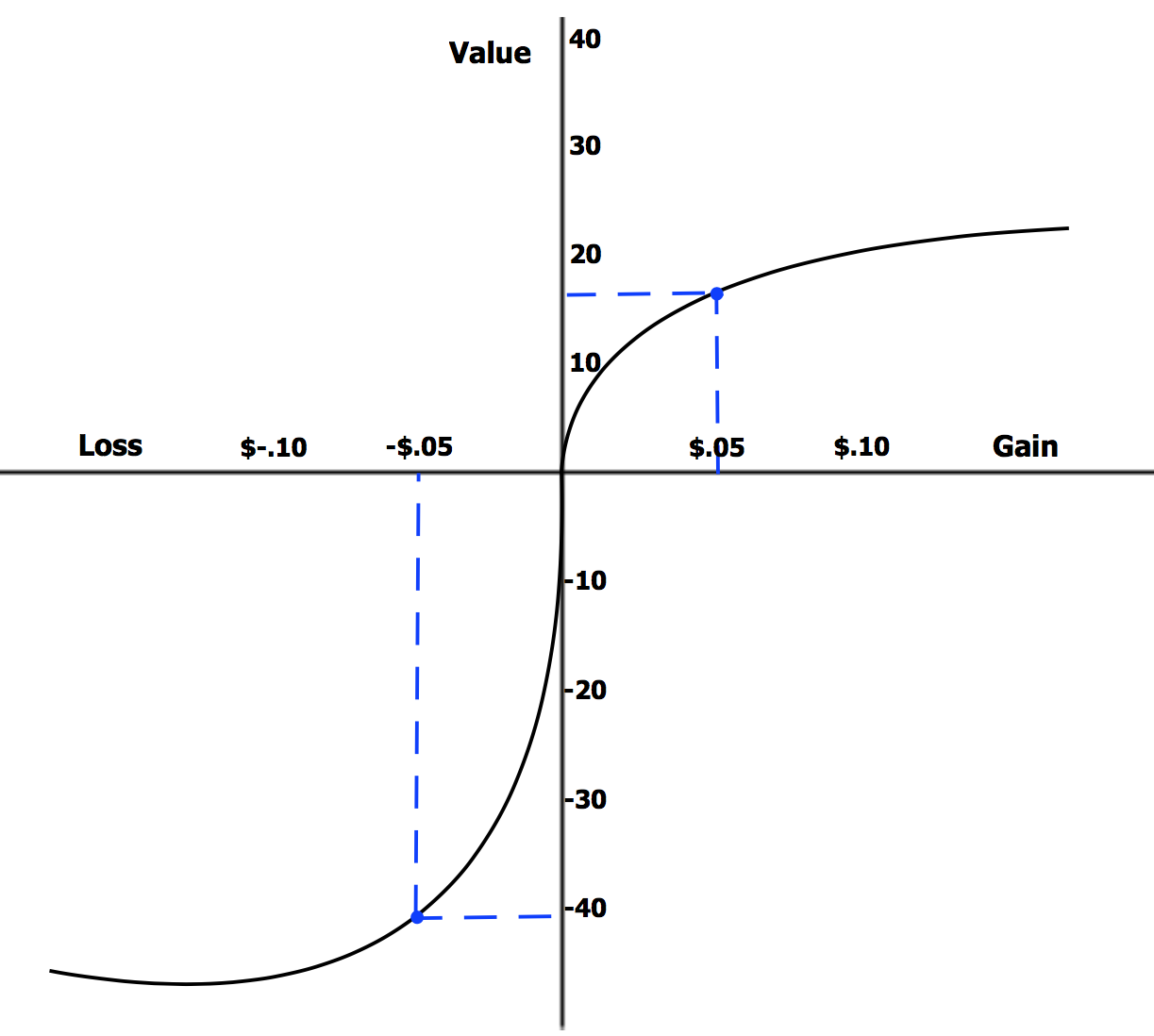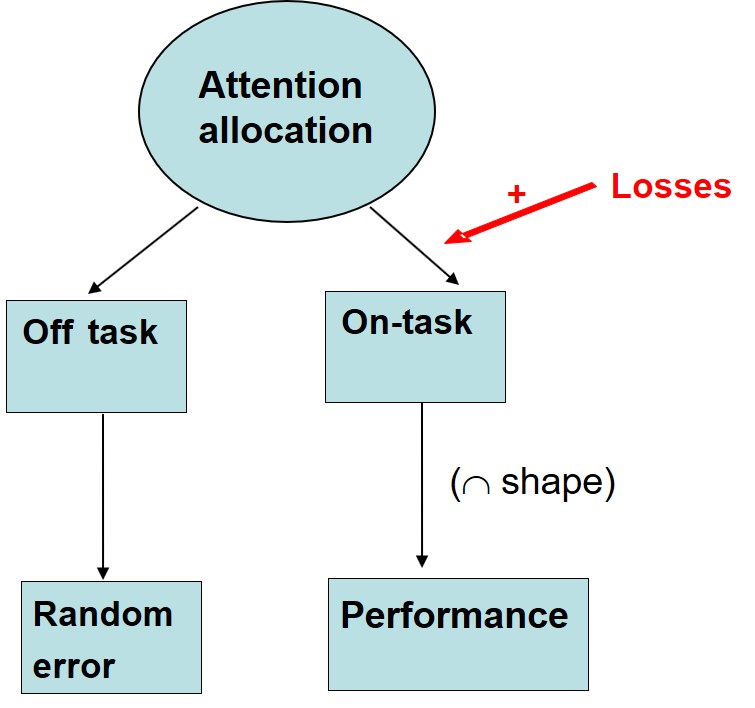|
Reference Dependence
Reference dependence is a central principle in prospect theory and behavioral economics generally. It holds that people evaluate outcomes and express preferences relative to an existing reference point, or status quo. It is related to loss aversion and the endowment effect. In prospect theory it is appropriate to use the selected status quo to determine the reference point. However, depending on the particular research being conducted researchers have proven reference dependence from more than just well known brands and the status quo. The types of reference points used varies but studies have used individual goals, aspirations and social comparisons. Alternative reference points are used by researches commonly in the school of phycology but present some challenges to the methodologies of studies. Measuring reference dependence in field studies and laboratory experiments presents challenges as reference point values are unique to individuals, they are highly malleable and can be pred ... [...More Info...] [...Related Items...] OR: [Wikipedia] [Google] [Baidu] |
Prospect Theory
Prospect theory is a theory of behavioral economics, judgment and decision making that was developed by Daniel Kahneman and Amos Tversky in 1979. The theory was cited in the decision to award Kahneman the 2002 Nobel Memorial Prize in Economics. Based on results from controlled studies, it describes how individuals assess their loss and gain perspectives in an asymmetric manner (see loss aversion). For example, for some individuals, the pain from losing $1,000 could only be compensated by the pleasure of earning $2,000. Thus, contrary to the expected utility theory (which models the decision that perfectly rational agents would make), prospect theory aims to describe the actual behavior of people. In the original formulation of the theory, the term ''prospect'' referred to the predictable results of a lottery. However, prospect theory can also be applied to the prediction of other forms of behaviors and decisions. Prospect theory challenges the expected utility theory deve ... [...More Info...] [...Related Items...] OR: [Wikipedia] [Google] [Baidu] |
Behavioral Economics
Behavioral economics is the study of the psychological (e.g. cognitive, behavioral, affective, social) factors involved in the decisions of individuals or institutions, and how these decisions deviate from those implied by traditional economic theory. Behavioral economics is primarily concerned with the bounds of rationality of economic agents. Behavioral models typically integrate insights from psychology, neuroscience and microeconomic theory. Behavioral economics began as a distinct field of study in the 1970s and 1980s, but can be traced back to 18th-century economists, such as Adam Smith, who deliberated how the economic behavior of individuals could be influenced by their desires. The status of behavioral economics as a subfield of economics is a fairly recent development; the breakthroughs that laid the foundation for it were published through the last three decades of the 20th century. Behavioral economics is still growing as a field, being used increasingly in ... [...More Info...] [...Related Items...] OR: [Wikipedia] [Google] [Baidu] |
Loss Aversion
In cognitive science and behavioral economics, loss aversion refers to a cognitive bias in which the same situation is perceived as worse if it is framed as a loss, rather than a gain. It should not be confused with risk aversion, which describes the rational behavior of valuing an uncertain outcome at less than its expected value. When defined in terms of the pseudo-utility function as in cumulative prospect theory (CPT), the left-hand of the function increases much more steeply than gains, thus being more "painful" than the satisfaction from a comparable gain. Empirically, losses tend to be treated as if they were twice as large as an equivalent gain. Loss aversion was first proposed by Amos Tversky and Daniel Kahneman as an important component of prospect theory. History In 1979, Daniel Kahneman and his associate Amos Tversky originally coined the term "loss aversion" in their initial proposal of prospect theory as an alternative descriptive model of decision makin ... [...More Info...] [...Related Items...] OR: [Wikipedia] [Google] [Baidu] |
Endowment Effect
In psychology and behavioral economics, the endowment effect, also known as divestiture aversion, is the finding that people are more likely to retain an object they own than acquire that same object when they do not own it. The endowment theory can be defined as "an application of prospect theory positing that loss aversion associated with ownership explains observed exchange asymmetries." This is typically illustrated in two ways. In a valuation paradigm, people's maximum willingness to pay (WTP) to acquire an object is typically lower than the least amount they are willing to accept (WTA) to give up that same object when they own it—even when there is no cause for attachment, or even if the item was only obtained minutes ago. In an exchange paradigm, people given a good are reluctant to trade it for another good of similar value. For example, participants first given a pen of equal expected value to that of a coffee mug were generally unwilling to trade, whilst participants f ... [...More Info...] [...Related Items...] OR: [Wikipedia] [Google] [Baidu] |
Lottery
A lottery (or lotto) is a form of gambling that involves the drawing of numbers at random for a prize. Some governments outlaw lotteries, while others endorse it to the extent of organizing a national or state lottery. It is common to find some degree of regulation of lottery by governments. The most common regulations are prohibition of sale to minors and licensing of ticket vendors. Although lotteries were common in the United States and some other countries during the 19th century, by the beginning of the 20th century, most forms of gambling, including lotteries and sweepstakes, were illegal in the U.S. and most of Europe as well as many other countries. This remained so until well after World War II. In the 1960s, casinos and lotteries began to re-appear throughout the world as a means for governments to raise revenue without raising taxes. Lotteries come in many formats. For example, the prize can be a fixed amount of cash or goods. In this format, there is risk to the org ... [...More Info...] [...Related Items...] OR: [Wikipedia] [Google] [Baidu] |
Marathon
The marathon is a long-distance foot race with a distance of kilometres ( 26 mi 385 yd), usually run as a road race, but the distance can be covered on trail routes. The marathon can be completed by running or with a run/walk strategy. There are also wheelchair divisions. More than 800 marathons are held worldwide each year, with the vast majority of competitors being recreational athletes, as larger marathons can have tens of thousands of participants. A creation of the French philologist Michel Bréal inspired by a story from Ancient Greece, the marathon was one of the original modern Olympic events in 1896 in Athens. The distance did not become standardized until 1921. The distance is also included in the World Athletics Championships, which began in 1983. It is the only running road race included in both championship competitions (walking races on the roads are also contested in both). History Origin The name ''Marathon'' comes from the legend of Pheidippides, the ... [...More Info...] [...Related Items...] OR: [Wikipedia] [Google] [Baidu] |
Status Quo
is a Latin phrase meaning the existing state of affairs, particularly with regard to social, economic, legal, environmental, political, religious, scientific or military issues. In the sociological sense, the ''status quo'' refers to the current state of social structure or values. With regard to policy debate, it means how conditions are contrasted with a possible change. For example: "The countries are now trying to maintain the ''status quo'' with regard to their nuclear arsenals." To maintain the ''status quo'' is to keep things the way they presently are. The related phrase '' status quo ante'', literally 'the status before', refers to the state of affairs that existed previously. Political usage The status quo may be changed via social movements. These seek to alleviate or prevent a particular issue and often to shape social feeling and cultural expression of a society or nation. Advocating to improve the status quo is a persuasive rhetorical device. This is sometimes ... [...More Info...] [...Related Items...] OR: [Wikipedia] [Google] [Baidu] |
Dependent And Independent Variables
A variable is considered dependent if it depends on (or is hypothesized to depend on) an independent variable. Dependent variables are studied under the supposition or demand that they depend, by some law or rule (e.g., by a mathematical function), on the values of other variables. Independent variables, on the other hand, are not seen as depending on any other variable in the scope of the experiment in question. Rather, they are controlled by the experimenter. In pure mathematics In mathematics, a function (mathematics), function is a rule for taking an input (in the simplest case, a number or set of numbers)Carlson, Robert. A concrete introduction to real analysis. CRC Press, 2006. p.183 and providing an output (which may also be a number). A symbol that stands for an arbitrary input is called an independent variable, while a symbol that stands for an arbitrary output is called a dependent variable. The most common symbol for the input is , and the most common symbol for the o ... [...More Info...] [...Related Items...] OR: [Wikipedia] [Google] [Baidu] |
Behavioral Economics
Behavioral economics is the study of the psychological (e.g. cognitive, behavioral, affective, social) factors involved in the decisions of individuals or institutions, and how these decisions deviate from those implied by traditional economic theory. Behavioral economics is primarily concerned with the bounds of rationality of economic agents. Behavioral models typically integrate insights from psychology, neuroscience and microeconomic theory. Behavioral economics began as a distinct field of study in the 1970s and 1980s, but can be traced back to 18th-century economists, such as Adam Smith, who deliberated how the economic behavior of individuals could be influenced by their desires. The status of behavioral economics as a subfield of economics is a fairly recent development; the breakthroughs that laid the foundation for it were published through the last three decades of the 20th century. Behavioral economics is still growing as a field, being used increasingly in ... [...More Info...] [...Related Items...] OR: [Wikipedia] [Google] [Baidu] |





